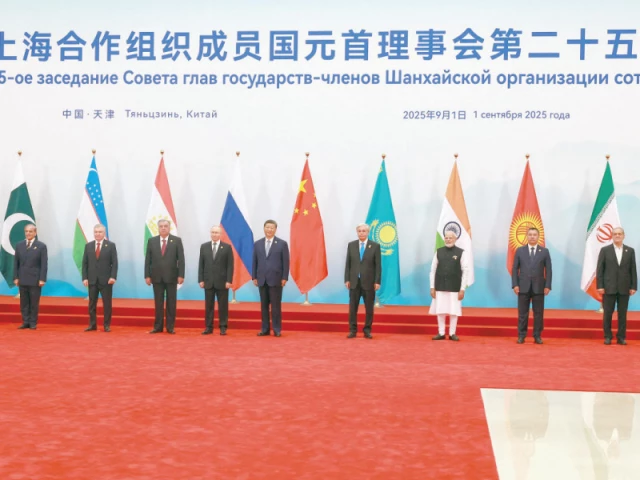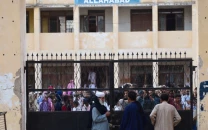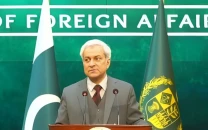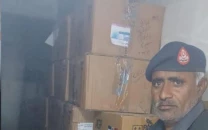SCO condemns terrorist attacks in Balochistan
10-member bloc also slams Pahalgam assault, urges 'Greater Eurasian Partnership' with SAARC, seeks immediate ce

The Shanghai Cooperation Organisation (SCO) on Monday condemned the terrorist attacks in Pakistan's Balochistan province in March and May, as well as the assault on tourists in Indian Illegally Occupied Jammu and Kashmir (IIOJK).
In a joint statement, the Council of Heads of Member States of the 10-member Eurasian political, economic and security bloc cautioned against double standards in the fight against terrorism and urged consensus on a global convention to counter the menace.
The SCO summit was held in the Chinese city of Tianjin under the chairmanship of President Xi Jinping. It was attended by Prime Minister Shehbaz Sharif of Pakistan, President Vladimir Putin of Russia, President Emomali Rahmon of Tajikistan, President Shavkat Mirziyoyev of Uzbekistan, President Kassym-Jomart Tokayev of Kazakhstan, President Sadyr Zhaparov of Kyrgyzstan, President Alexander Lukashenko of Belarus, President Masoud Pezeshkian of Iran, and Prime Minister Narendra Modi of India.
The leaders adopted the joint statement condemning the Jaffar Express train hijacking on March 11 in Balochistan and the bombing of a school bus in Khuzdar on May 21. It also condemned the April 22 attack in Pahalgam, a tourist hotspot in IIOJK.
The member states strongly condemned terrorism in all its forms and manifestations and stressed that double standards in the fight against terrorism were unacceptable. They underscored the importance of adopting by consensus a comprehensive convention on international terrorism, the statement said.
According to the statement, the leaders expressed their deepest sympathy and condolences to the families of the deceased and the wounded, stating that perpetrators, organisers and sponsors of such attacks must be brought to justice.
While reaffirming their firm commitment to the fight against terrorism, separatism and extremism, the leaders stressed "the inadmissibility of attempts to use" terrorist, separatist and extremist groups for mercenary purposes.
They recognised the leading role of sovereign states and their competent authorities in countering terrorist and extremist threats and emphasised the importance of multilateral cooperation in combating terrorism and terror financing.
"Member States reaffirm their determination to continue the joint fight against terrorism, separatism and extremism, as well as against the illicit trafficking of narcotic drugs, psychotropic substances and their precursors, arms smuggling and other forms of transnational organised crime," the statement said.
The joint statement said that the SCO member states vowed to step up joint efforts to prevent the spread of radical ideologies, religious intolerance and xenophobia, aggressive nationalism, and ethnic and racial discrimination.
"They adopted the Programme of Cooperation of Member States in Countering Extremist Ideology in the SCO Area for 2026-2030, aimed, inter alia, at the implementation by the participating States of the SCO Convention on Countering Extremism (Astana, 9 June 2017)," it added.
Chaos and conflicts
The statement noted that geopolitical confrontation, challenges and threats to security and stability, including in the SCO region, were intensifying. The global economy, especially international commodity and financial markets, was experiencing serious turmoil.
"There is a growing desire to create a more just, equitable and representative multipolar world order that opens up new prospects for the development of states and mutually beneficial international cooperation," it said.
The leaders reaffirmed their commitment to a more representative, democratic, just and multipolar world order based on the principles of international law and the UN Charter and respect for cultural diversity, and mutually beneficial and equal cooperation between states.
The member states adhered to a line that excludes bloc and confrontational approaches to solving international and regional development problems. They emphasised that cooperation within the SCO could serve as a basis for the formation of an architecture of equal and indivisible security in Eurasia.
The member states committed to ensuring sustainable international peace and called for joint efforts to counter traditional and new security challenges and threats. In order to further improve the activities of the SCO, the member states adopted the SCO Development Strategy until 2035.
Gaza and Iran
Reiterating their deep concern over the continuing escalation of the Palestinian-Israeli conflict, the member states strongly condemn the actions that have led to numerous casualties among the civilian population and a catastrophic humanitarian situation in the Gaza Strip.
They stressed the need for ensuring an immediate, complete and sustainable ceasefire, access to humanitarian aid, and intensified efforts to achieve peace, stability and security for all residents of the region, the joint statement said.
The SCO condemned the military strikes by Israel and the US against Iran in June. They said that such aggressive actions against civilian targets, including nuclear energy infrastructure, which resulted in the death of civilians, were a gross violation of the international law and the UN Charter.
"They noted that the physical nuclear safety and security of nuclear facilities must be ensured on a permanent basis, including during periods of armed conflict, in order to protect the population and the environment from harm," said the joint statement.
The statement emphasised the nation's right to develop research, production and use of atomic energy for peaceful purposes, and stressed that unilateral restrictive measures in this area were contrary to international law and are unacceptable.
While reaffirming the commitment to diplomatic initiatives aimed at the peaceful resolution of the issues, the SCO leaders called for the resumption of constructive dialogue between the parties involved, and for a focus on jointly seeking solutions that would prevent further escalation of the situation.
Reaffirming their commitment to the establishment of Afghanistan as an independent, neutral and peaceful state, free from terrorism, war and drugs, the member states stressed the formation of an inclusive government with broad participation of representatives of all ethno-political groups.
The SCO summit noted plans to hold the 'SCO-Plus Dialogue on Security Issues' in Tashkent; the proposal to prepare and sign an agreement on confidence-building measures in the military sphere and backed further deepening practical cooperation in the fight against drug trafficking.
The SCO said that a country's attempts to ensure security at the expense of the security of other countries were unacceptable. They warned that the unilateral and unrestrained development of global anti-missile defence systems had a negative impact on international security and stability.
According to the statement, the member states, excluding India, reaffirmed their support for China's Belt and Road Initiative (BRI). The summit also adopted a statement on support for the multilateral trading system and the initiative to develop an agreement on trade facilitation within the SCO.
The leaders called for the initiative to establish a 'Greater Eurasian Partnership' and expressed their readiness to develop dialogue between the SCO, the Eurasian Economic Union, the Association of Southeast Asian Nations (Saarc), as well as other interested states and multilateral associations.
Reaffirming the importance of establishing an SCO Development Bank, the interested member states decided to establish it and intensify consultations on a range of issues related to the functioning of this financial institution.
The member states sought to deepen cooperation in the field of sport, noting the importance of removing barriers to participation in sporting competitions. They stressed that major international sporting events should be organised in a spirit of peace and friendship without any discrimination.
The SCO chairmanship will pass to the Kyrgyz Republic and will be held under the slogan "25 years of the SCO: together towards sustainable peace, development and prosperity". The next meeting of the Council of Heads of Member States of the SCO will be held in 2026 in the Kyrgyz Republic.



















COMMENTS
Comments are moderated and generally will be posted if they are on-topic and not abusive.
For more information, please see our Comments FAQ